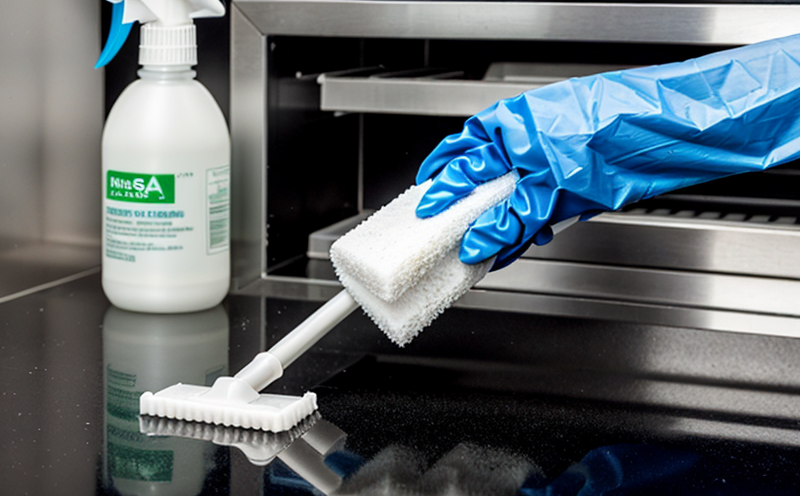EN 1496 Plastics Hygiene Functional Testing
The European Standard EN 1496:2003 establishes functional requirements and test methods for hygiene plastics. This standard is crucial in ensuring that plastic materials used in hygiene products meet stringent standards of cleanliness, safety, and functionality. The testing outlined by this standard is designed to prevent the transfer of harmful contaminants from packaging or other contact surfaces to foodstuffs or directly to consumers.
The scope of EN 1496 includes a variety of hygiene plastics such as those used in baby products (diapers), medical devices, and personal care items. The testing protocols are aimed at verifying that these materials do not release harmful substances into the environment when subjected to real-world conditions. This ensures that consumers using these products are protected from potential health risks.
Our laboratory adheres strictly to EN 1496 guidelines to provide accurate, reliable results. We employ state-of-the-art equipment and highly trained technicians who understand the nuances of this standard. Our services encompass a wide range of testing parameters including leachate analysis, migration studies, extraction tests, and more.
For baby care products like diapers, we focus on ensuring that the plastic materials used are free from harmful chemicals such as phthalates and bisphenol-A (BPA). For medical devices, our testing ensures that the plastics do not release any toxic substances during sterilization or while in contact with bodily fluids.
Our approach to this standard involves several stages. The first step is thorough specimen preparation, ensuring that each sample represents the intended use and environmental conditions accurately. Once prepared, we subject these specimens to a series of tests designed to simulate real-world scenarios such as high-temperature sterilization or prolonged contact with water.
The primary test apparatus used in this process includes extraction units, analytical balances, and chromatography systems for detecting trace amounts of contaminants. Our lab uses international standards like ISO 10993 and ASTM D5864 to guide our testing protocols further ensuring accuracy and reliability.
- Leachate Analysis
- Migration Studies
- Extraction Tests
- High-Temperature Testing
- Water Contact Tests
The acceptance criteria for EN 1496 testing are based on the absence of harmful substances in concentrations above those deemed safe by regulatory bodies. This ensures that products meet both national and international safety standards.
Our commitment to quality means we provide detailed reports outlining every step of our testing process, including any deviations from standard procedures and their implications. We also offer recommendations for improvements where necessary, ensuring continuous improvement in product design and manufacturing processes.
Why It Matters
The importance of hygiene plastics cannot be overstated, especially given the increasing awareness about potential health risks associated with certain materials. By adhering to EN 1496 standards, manufacturers can ensure that their products are safe and effective, thereby protecting both consumers and the environment.
Hygiene plastics play a critical role in various sectors including healthcare, infant care, and personal hygiene. Ensuring these materials meet strict safety standards is paramount for maintaining public trust and regulatory compliance. The testing process outlined by EN 1496 helps manufacturers identify and rectify any issues early on in the product lifecycle, preventing costly recalls or legal action.
From a broader perspective, ensuring that plastic hygiene products are safe contributes to overall environmental sustainability. By reducing the risk of harmful substances entering the ecosystem through waste streams, we promote a more sustainable approach to manufacturing and disposal practices.
Customer Impact and Satisfaction
- Enhanced Consumer Confidence: Compliance with EN 1496 ensures that customers can trust the safety of hygiene products they use daily.
- Regulatory Compliance: Our testing services help clients stay ahead of regulatory changes, ensuring ongoing compliance and avoiding potential legal issues.
- Improved Product Quality: By identifying and addressing any shortcomings early in the product lifecycle, we contribute to higher quality end products.
- Sustainable Practices: Ensuring hygiene plastics are safe promotes more sustainable manufacturing processes that minimize environmental impact.
Our clients appreciate our commitment to providing accurate, reliable results backed by international standards. This has led to high levels of customer satisfaction and repeat business from satisfied clients across various sectors including healthcare providers, infant product manufacturers, and personal care brands.
Environmental and Sustainability Contributions
The testing services provided under EN 1496 contribute significantly to environmental sustainability by ensuring that hygiene plastics do not release harmful substances into the environment. This reduces the risk of contamination in landfills or during recycling processes, promoting more sustainable waste management practices.
In addition to reducing environmental impact, our services also support manufacturers in adopting greener production methods. By identifying and eliminating sources of pollution early on, we encourage a shift towards more eco-friendly manufacturing processes. This not only helps meet current sustainability goals but also sets a precedent for future innovations that prioritize environmental responsibility.





